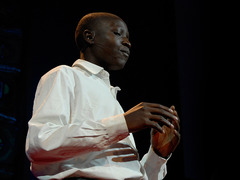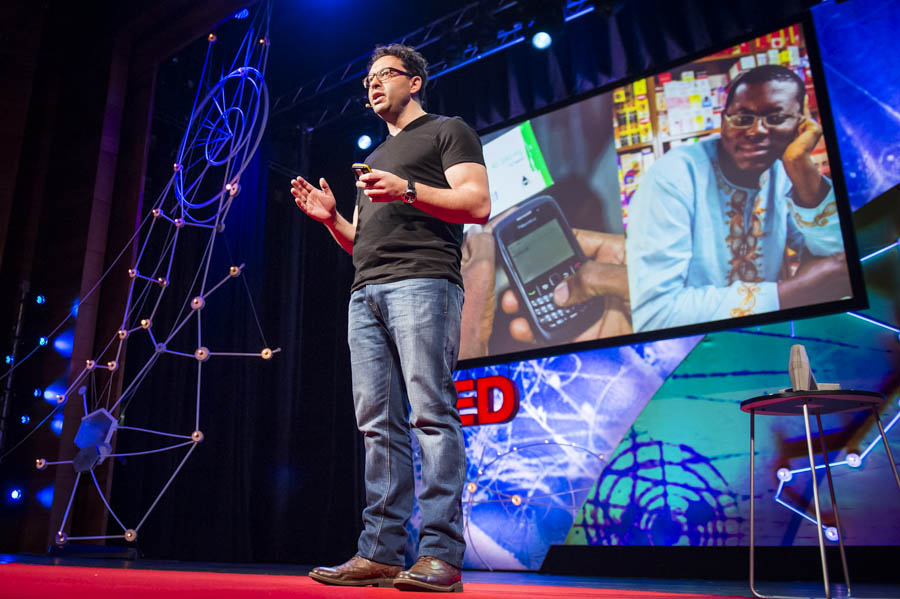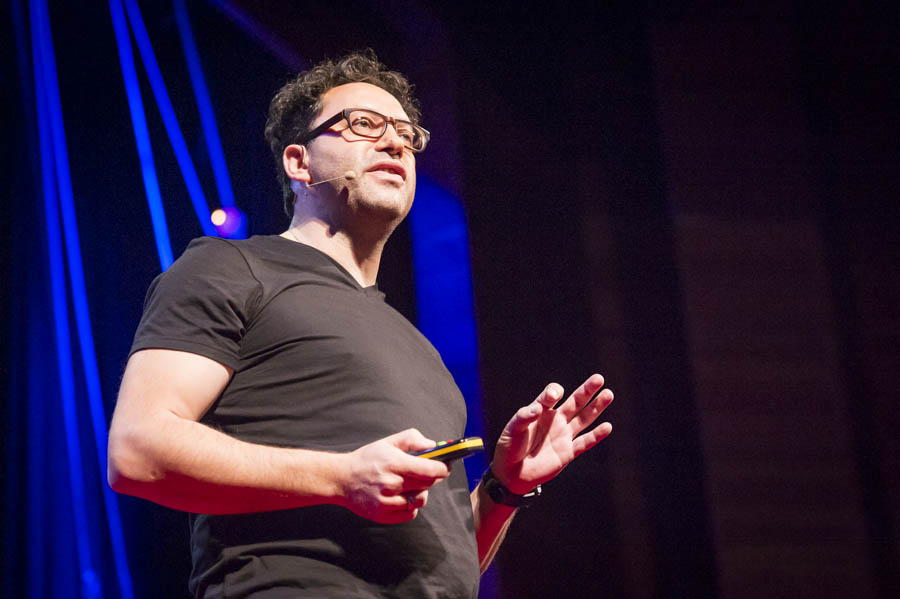The publisher and editor of the South African edition of Stuff magazine, Toby Shapshak is here to challenge our perceptions of his home continent. First, he asks us, who bought a pay-as-you-go SIM card on arriving in Edinburgh? Hands wave. “You’re using African technology,” he says proudly. “‘Pay-as-you-go’ was an idea pioneered in Africa by Vodacom 15 years ago. Now, pay-as-you-go is one of the most dominant forces of economic activity in the world.”
Shapshak shows us what he says is the obligatory satellite picture of the world at night; nations that have electricity glow with light. As we expect, Africa is distinctly unwired. “It’s the dark continent!” he says mockingly, before promptly subverting our preconceptions. “It’s a map of innovation. All the places with lots of electricity, innovation isn’t.” Why is that? If you have electricity, you’re watching television or playing Angry Birds. Big laughs and claps from the audience.
Innovation in Africa, he says, is real innovation. “People are solving real problems in Africa because we have to, because we have them. And when we solve real problems, we solve them for the rest of the world.”
Without naming the company, Shapshak talks about Square, the service that has “liberated the credit card from the point-of-sale terminal,” he says. “But why do you need a credit card?” He references M-Pesa, the African SMS service that works on pretty much every mobile phone to allow people to pay bills, buy groceries, send payments, even, he jokes, bribe customs officials. $25 million a day — and 40% of Kenya’s GDP — now passes through M-Pesa.
“I come from Johannesburg,” says Shapshak, an entirely comfortable figure on the TED stage, who is clearly enjoying his moment. “It’s a mining town built on gold. The gold of today is mobile.” He describes some other mobile-based services now at work in Africa, such as a SMS service that allows someone to check whether an expensive medication is legitimate or expired. [See a talk on this topic by Ashifi Gogo at TEDxBoston.] Then there’s iCow, to help farmers to look after their herds. “The difference between subsistence and abundance for a farmer is a couple of liters of milk a day,” says Shapshak. In other words, these aren’t frilly nice-to-have apps; such services make a real impact.
 William Kamkwamba: How I built a windmill
No electricity? No problem. Shapshak refers to TED speaker William Kamkwamba, who built a windmill to make electricity. And he mentions Pretoria’s favorite son, Elon Musk, who’s busy disrupting industries from automotive to energy to space travel.
William Kamkwamba: How I built a windmill
No electricity? No problem. Shapshak refers to TED speaker William Kamkwamba, who built a windmill to make electricity. And he mentions Pretoria’s favorite son, Elon Musk, who’s busy disrupting industries from automotive to energy to space travel.
“But not only is mobile the gold of today,” Shapshak adds. “We are the gold. We are at the point China was at when its boom years began. And that’s where we are going. We hear the west talk about ‘innovation at the edge.’ Well, of course it’s happening at the edge. In the middle, people are too busy updating Facebook, or maybe trying to understand Facebook’s privacy settings.” The crowd is loving it.
“This is innovation ‘over the edge’,” he concludes. “People call Africa a ‘mobile-only’ continent, but actually it’s ‘mobile-first,'” and it’s a laboratory for innovating things we’ll all eventually end up using. There’s only one thing left to say. Shapshak doesn’t say it. Instead, a slide flashes up onscreen. It says simply “you’re welcome.”


Comments (19)
Pingback: 12 απλές τεχνολογίες για τις πόλεις που είναι έξυπνες, ανοικτές και δίκαιες | Hellas All News
Pingback: Why Africa needs Maker Faire | Nagg
Pingback: 12 simple technologies for cities that are Smart, open and fair | The Urban Technologist
Pingback: Ci serve davvero un’app?! « SocialTechnology
Pingback: 15 African startups to watch in 2014 | Times of News | Online breaking and Latest News From NIGERIA
Pingback: 15 African Tech Startups to Watch in 2014 | The Burton Wire
Pingback: 15 African startups to watch in 2014
Pingback: 15 African startups to watch in 2014
Pingback: 15 African technology startups to watch in 2014 – CNN | Everyday News Update
Pingback: 15 startups to watch in 2014
Pingback: 14 +1 startups to watch in 2014 – الخبر.نت|al5br.net
Pingback: Stuff’s @shapshak at TEDGlobal 2013 on Africa and mobile innovation | Stuff
Pingback: MAGIC VIDEO HUB | The case for bottom-up entrepreneurship: Iqbal Quadir teaches the next generation how to innovate
Pingback: User innovation: a treasure box for development? | Life & Dev
Pingback: User innovation: a treasure box for development? | Voices from Eurasia - We help build better lives.
Pingback: TED Global lauds SA publisher, editor Toby Shapshak | memeburn
Pingback: Stuff's @shapshak at TEDGlobal 2013 - Stuff